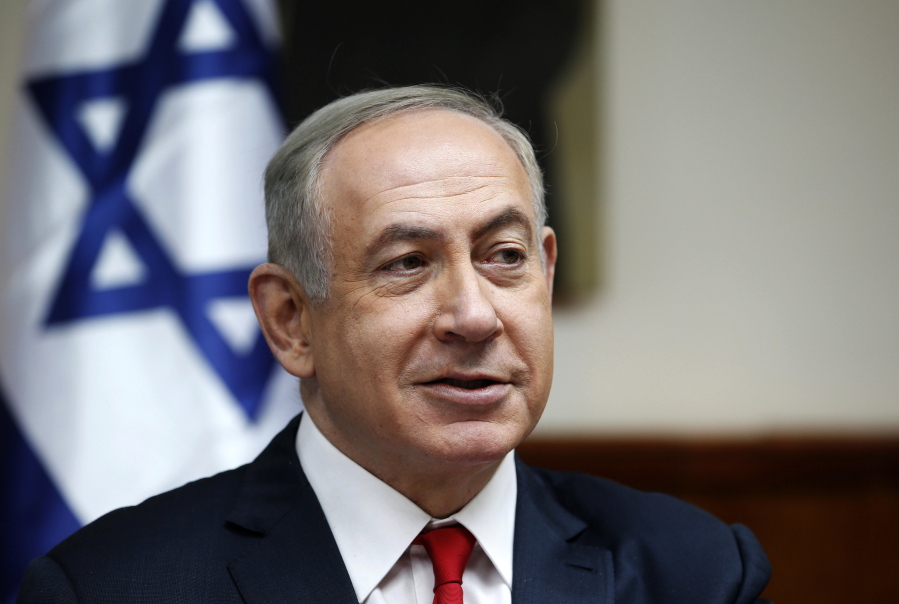JERUSALEM — Israel’s prime minister on Sunday accepted an invitation to visit the White House next month in hopes of forging a “common vision” for the region with President Donald Trump that could include expanded settlement construction on occupied territories and a tougher policy toward Iran.
Prime Minister Benjamin Netanyahu announced his plans to head to Washington in early February hours after delaying a vote on an explosive proposal to annex one of the West Bank’s largest settlements, apparently to coordinate his policy toward the Palestinians with the new administration.
The move put on hold legislation that threatens to unleash fresh violence and damage already faded hopes for Palestinian independence. It also may have marked Trump’s first presidential foray into Middle East diplomacy.
After eight years of frosty relations with President Barack Obama, Netanyahu has welcomed Trump’s election as an opportunity to strengthen ties between the two allies. Israeli media reported that Netanyahu was gearing up plans to expand settlement construction in the occupied West Bank and east Jerusalem — a policy that had been condemned by Obama.
Late Sunday, the two men held what Netanyahu’s office described as a “very warm conversation” by phone. It said they discussed the international nuclear deal with Iran, which both men have harshly criticized, and the Palestinian issue.
“The prime minister expressed his desire to work closely with President Trump to forge a common vision to advance peace and security in the region, with no daylight between the United States and Israel,” the statement said. It said a date for Netanyahu’s visit would be finalized in the coming days.
The White House said Trump told Netanyahu that peace with the Palestinians “can only be negotiated directly between the two parties” and that the U.S. will work closely with Israel on that goal.
Trump also affirmed his “unprecedented commitment to Israel’s security” and his administration’s focus on countering terrorism, the White House added.
With Trump signaling a more tolerant approach toward the much-maligned settlement movement, Israel’s nationalist right now believes it has an ally in the White House, and Israeli hard-line leaders make no secret they will push for aggressive action in the occupied West Bank.
Education Minister Naftali Bennett, leader of the pro-settlement Jewish Home Party, has been pushing Netanyahu to abandon the internationally backed idea of a Palestinian state and to annex the Maaleh Adumim settlement near Jerusalem.
But after convening his Security Cabinet on Sunday, Netanyahu said his Cabinet ministers, including Bennett, had decided “unanimously” to delay action on the annexation plan until he goes to Washington to meet with Trump.
In order to placate Bennett, Israeli media reports said Netanyahu had promised the ministers to clear the way for expanded settlement construction in east Jerusalem and in major West Bank settlement “blocs” that Israel hopes to keep under a future peace deal. He was quoted as saying his “vision” is to place all settlements under Israeli sovereignty.
In Washington, Trump described their phone call as “very nice.”
Netanyahu, a longtime supporter of the settlements, has nonetheless been cautious about expanding them in the face of strong opposition from the international community. In a final showdown with Israel last month, the Obama administration allowed the U.N. Security Council to pass a resolution condemning settlements as illegal.
But Bennett and other hard-liners believe there is no longer any reason for restraint.
“For the first time in 50 years, the prime minister can decide: either sovereignty or Palestine,” Bennett wrote on Twitter.
Annexing Maaleh Adumim, a sprawling settlement of nearly 40,000 people east of Jerusalem, could cause a major clash with the Palestinians and the rest of the international community.
The Palestinians seek all of the West Bank and east Jerusalem — areas captured by Israel in the 1967 Mideast war — for a future state. The Palestinians and the international community consider all settlements illegal, and unilaterally making Maaleh Adumim part of Israel would deal a powerful blow to hopes for a two-state solution.
To the Palestinians, it would be seen as undermining negotiations. Maaleh Adumim is also strategically located in the middle of the West Bank, potentially hindering the establishment of their state.
“If they are serious about making it part of Israel and closing it down, then it is actually cutting the West Bank into two,” said Hagit Ofran of the anti-settlement group Peace Now.
While Trump has not expressed an opinion on the annexation, he has signaled a softer approach toward the settlement movement than any of his predecessors.
His designated ambassador to Israel has close ties to Jewish West Bank settlements.



